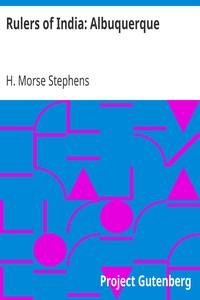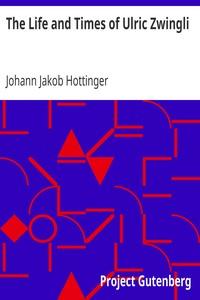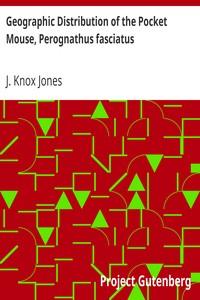Read this ebook for free! No credit card needed, absolutely nothing to pay.
Words: 60787 in 18 pages
This is an ebook sharing website. You can read the uploaded ebooks for free here. No credit cards needed, nothing to pay. If you want to own a digital copy of the ebook, or want to read offline with your favorite ebook-reader, then you can choose to buy and download the ebook.


: Rulers of India: Albuquerque by Stephens H Morse Henry Morse - Albuquerque Afonso de 1453-1515; Portuguese India Biography; India History 1000-1526
ALBUQUERQUE
THE PREDECESSORS OF ALBUQUERQUE
The importance to Europe of the successful establishment of the Portuguese in the East was manifested in two widely different directions. On the one hand, it checked the rapid advance of Muhammadanism as represented by the Turks. In the sixteenth century the advance of the Turks was still a terror to Europe; Popes still found it necessary to preach the necessity of a new Crusade; the kings of Christendom occasionally forgot their own feuds to unite against the common enemy of the Christian religion; and the Turks were then a progressive and a conquering and not, as they are now, a decaying power. It was at this epoch of advancing Muhammadanism that the Portuguese struck a great blow at Moslem influence in Asia which tended to check its progress in Europe.
Of equal importance to this great service to the cause of humanity was the fact that the Portuguese by establishing themselves in Asia introduced Western ideas into the Eastern world, and paved the way for that close connection which now subsists between the nations of the East and of the West. That connection was in its origin commercial, but other results have followed, and the influence of Asia upon Europe and of Europe upon Asia has extended indefinitely into all departments of human knowledge and of human endeavour.
A wide contrast must be drawn between the Portuguese connection with Asia and between the English and Spanish connection with America. In the latter case the exploring and conquering Europeans had to deal with savage tribes, and in many instances with an uncultivated country; in the former the Portuguese found themselves confronted with a civilisation older than that of Europe, with men more highly educated and more deeply learned than their own priests and men of letters, and with religions and customs and institutions whose wisdom equalled their antiquity.
The India which was reached by Vasco da Gama, and with which the Portuguese monopolised the direct communication for more than a century, was very different to the India with which the Dutch and English merchants sought concessions to trade. The power of the Muhammadans in India was not yet concentrated in the hands of the great Mughals; there were Moslem kingdoms in the North of India and in the Deccan, but the South had not yet felt the heavy hand of Musalman conquerors, and the Hindu R?j? of Vijayanagar or Narsingha was the most powerful potentate in the South of India. The monarchs and chieftains whom the Portuguese first encountered were Hindus. Muhammadan merchants indeed controlled the commerce of their dominions, but they had no share in the government; and one of the ruling and military classes consisted, on the Malabar coast, where the Portuguese first touched, of Nestorian Christians.
The concentration of all commerce in the hands of the believers in the Prophet was not favourably regarded by the wisest of the Hindu rulers, who were therefore inclined to heartily welcome any competitors for their trade. The condition of the Malabar coast at the time of the arrival of the Portuguese was particularly favourable to the Portuguese endeavours, and, had they been inspired with nineteenth-century instead of with sixteenth-century ideas of religion and morality, a prosperous and peaceful commerce might easily have sprung up between the East and the West.
But if the India which Vasco da Gama reached was favourably inclined to open relations with the nation to which he belonged, Portugal was also at that time singularly well fitted by circumstances to send forth men of daring and enterprise to undertake the task. The Portuguese nation had grown strong and warlike from its constant conflict with the Moors in the Peninsula, and the country attained its European limits in 1263. Since that time it had become both rich and populous, and a succession of internal troubles had led to the establishment of a famous dynasty upon the throne of Portugal.
Commerce with the East sprang up in Europe with civilisation. As soon as any nation became rich it began to desire luxuries which could not be procured at home. The Romans in the days of their greatness knew of the products of Asia, and attained them at a great price. Throughout the Middle Ages the commodities of Asia were known and valued, and as civilisation progressed and Europe emerged from barbarism the demand for pepper and ginger, for spices and silks and brocades increased.
The original trade routes for the products of India were overland. The goods were borne in caravans from the North-West frontier of India across Persia to Aleppo and thence by ship to Italy and to whatever other country was rich enough to purchase them. But after the growth of Muhammadanism and of the power of the Turks, the caravan routes across Central Asia became unsafe. Two new routes then came into use, the one by the Persian Gulf, and the other by the Red Sea. Goods which went by the Persian Gulf were carried overland to Aleppo and other ports in the Levant; goods that went by the Red Sea were carried across Egypt from Suez to Alexandria. From these two entrep?ts of Eastern and especially of Indian trade the articles of commerce were fetched by Venetian ships, and from Venice were distributed throughout Europe.
In the days of the Renaissance the products of the East passed through the hands of Muhammadan merchants from India to the Mediterranean, and the large profits they made were commensurate with the risks they undertook. With the rapid growth of civilisation the value of this trade became enormous: every city through which it passed was enriched; Venice became the wealthiest State in Europe; and the cost of all Indian luxuries and spices was extravagantly high.
All wise kings envied the prosperity of Venice, and schemed to secure a share of the Eastern trade for their subjects. Mention has been made of the five illustrious princes, the sons of John the Great and Eleanor of Lancaster. One of them is known in history as Prince Henry the Navigator. This prince devoted his life to the discovery of a direct sea route from Portugal to India. He established himself on the promontory of Sines, and collected around him the most learned geographers and mathematicians of the age. With them he discussed the probability of its being possible to sail round the continent of Africa and thus reach India. Year after year he sent forth expeditions to explore the African coast. Many and important discoveries were made by his navigators, and a generation of skilful pilots and adventurous sailors was formed by his wise encouragement.
Free books android app tbrJar TBR JAR Read Free books online gutenberg
More posts by @FreeBooks

: The Life and Times of Ulric Zwingli by Hottinger Johann Jakob Porter Thomas C Thomas Conrad Translator - Zwingli Ulrich 1484-1531; Reformation Switzerland


: Geographic Distribution of the Pocket Mouse Perognathus fasciatus by Jones J Knox - Pocket mice Animal; Animals-Wild-Mammals




